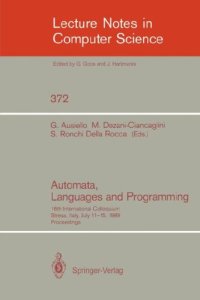
Ebook: Automata, Languages and Programming: 16th International Colloquium Stresa, Italy, July 11–15, 1989 Proceedings
- Genre: Computers // Programming
- Tags: Mathematical Logic and Formal Languages, Logics and Meanings of Programs, Computation by Abstract Devices, Algorithm Analysis and Problem Complexity, Combinatorics, Processor Architectures
- Series: Lecture Notes in Computer Science 372
- Year: 1989
- Publisher: Springer-Verlag Berlin Heidelberg
- Edition: 1
- Language: English
- djvu
This volume contains the proceedings of ICALP 89, held at Stresa, Italy, July 11-15, 1989. ICALP 89 is the 16th International Colloquium on Automata, Languages and Programming in a series of meetings sponsored by the European Association for Theoretical Computer Science (EATCS). It is a broadly based conference covering all aspects of theoretical computer science including topics such as computability, automata theory, formal language theory, analysis of algorithms, computational complexity, mathematical aspects of programming language definition, logic and semantics of programming languages, foundations of logic programming, theorem proving, software specification, computational geometry, data types and data structures, theory of data bases and knowledge based systems, cryptography, VLSI structures, parallel and distributed computing, models of concurrency and robotics.
This volume contains the proceedings of ICALP 89, held at Stresa, Italy, July 11-15, 1989. ICALP 89 is the 16th International Colloquium on Automata, Languages and Programming in a series of meetings sponsored by the European Association for Theoretical Computer Science (EATCS). It is a broadly based conference covering all aspects of theoretical computer science including topics such as computability, automata theory, formal language theory, analysis of algorithms, computational complexity, mathematical aspects of programming language definition, logic and semantics of programming languages, foundations of logic programming, theorem proving, software specification, computational geometry, data types and data structures, theory of data bases and knowledge based systems, cryptography, VLSI structures, parallel and distributed computing, models of concurrency and robotics.